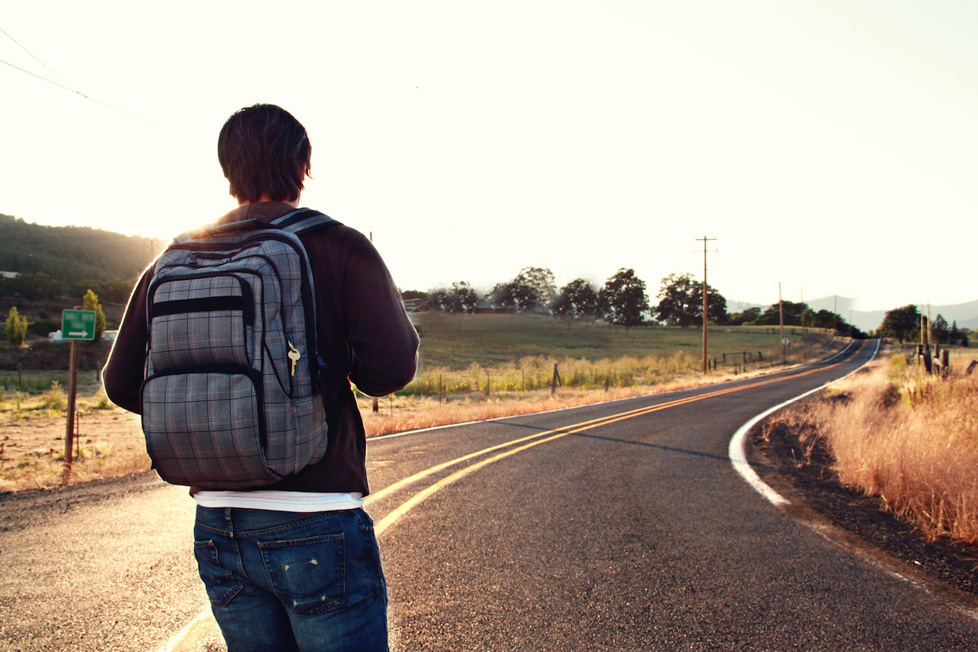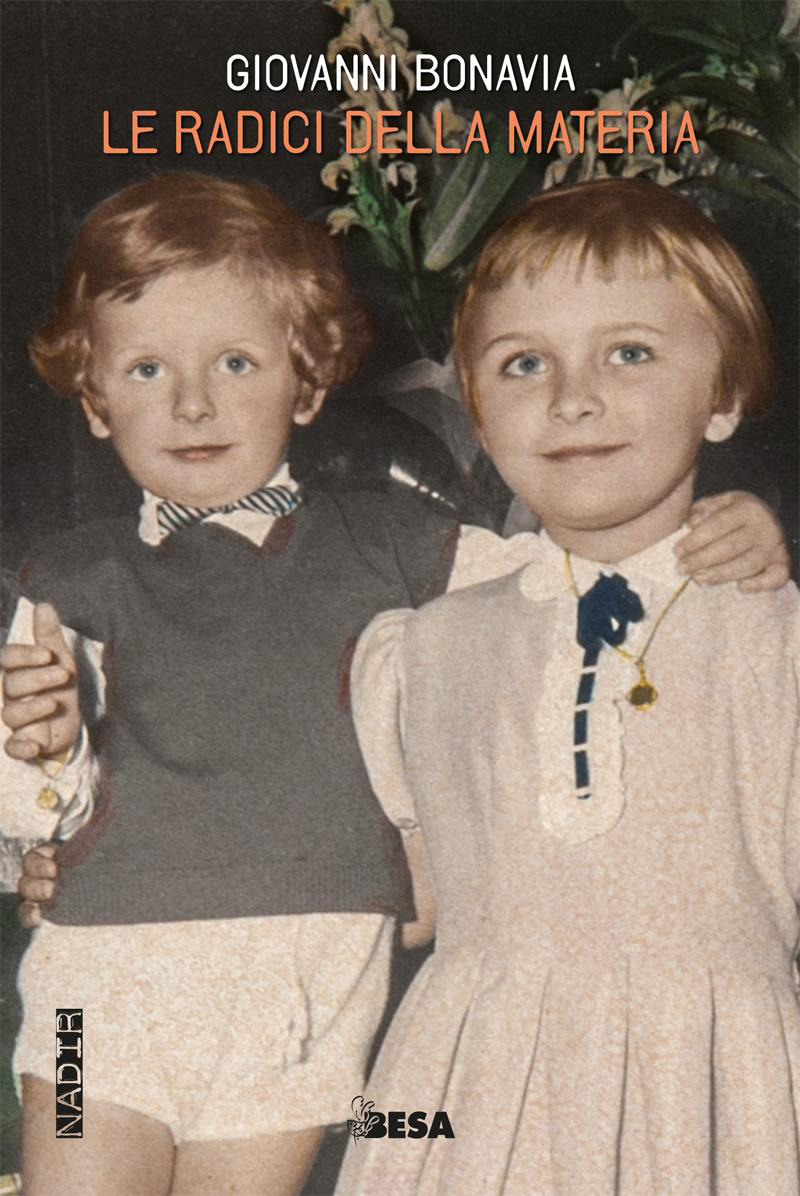Il libro di Giovanni Bonavia “Le radici della materia” per ricordi e parole “a bordo campo”
Una scrittura libera e disinvolta nel libro di Giovanni Bonavia con cui comincia la gara, comincia il viaggio, e si srotola il film della nostra vita.

Una scrittura libera e disinvolta nel libro di Giovanni Bonavia con cui comincia la gara, comincia il viaggio, e si srotola il film della nostra vita.

(English translation below)
“La gara è come un viaggio, un viaggio dove si sospende la legge. La legge del viaggio è portarsi dietro tre tombarlà di cose, le canottiere e le calze spesse e fine e i regali per chi ti aspetta e magari anche la moglie noiosa. Sospender la legge vuol dire partire leggero, con più forza e leggerezza possibile, nudo e deciso come quando ti aspetta la bernarda”.
Così, quasi alla fine de Le radici della materia, alla fine di un‘autobiografia che procede come un gioco dell’oca passando da una casella all’altra – ognuna un ricordo, una suggestione – Giovanni Bonavia dischiude al lettore, che è viaggiatore, il suo talismano.
Siamo a bordo campo, in attesa di una gara nel campo sportivo della provincia piemontese. I capitoli scandiscono l’ora e i minuti, e in questo tempo di attesa che è già partecipazione all’evento agonistico, si è partiti.
Sarà un’escursione di apparente sconfinatezza, personaggi ed episodi s’inseguono l’un l’altro nella memoria, ma sconfinatezza non è: è proprio il campo sportivo a ricordare al viaggiatore che la sua strada è cammino solo se è delineata, come lo sono un sentiero, una via sulla parete della roccia; non potrebbe essere più chiaro di così:
“Eccola, la pista. Ora che il mio vivere è mille e debordato, come un’ameba, penso spesso all’atletica, all’atletica forsennata centro un perimetro, libera dentro il perimetro. Chi non ha un perimetro non è libero; è vagabondo; è perduto. E chi è perduto restringe l’hangar arioso dove vuole abitare la luce respirante, l’anima. Ma allo stretto l’anima non può stare. Se ne va”.
È la pista battuta dalla quale non escono i nomadi, e mentre Giovanni Bonavia pondera la differenza tra viaggiatore e vagabondo, sul campo si alternano gli annunci della vita, le tensioni degli attimi appena prima la partenza:
“Grande è la tensione per la regina delle gare. Non una competizione per normali atleti. Non per uomini dappoco. Chi parte per i quattrocento piani sa che vivrà trenta secondi in totale debito d’ossigeno, col corpo e il fiato avvelenato dall’acido lattico. Astegiano in prima. Mondello in seconda. Tribaudino in terza. Liberaci in quarta. Colosso in quinta…”.
A bordo campo ognuno di noi è già in un terreno separato, e, come Giovanni Bonavia, raccoglie i cocci della propria vita e ci pensa sopra. È quel che fa il maratoneta (Bonavia ne è uno) mentre corre, ed è quello che ci accade mentre viaggiamo: si parte, si pensa, spesso ricapitoliamo la nostra vita, con quel magico meccanismo del viaggio – e dello scrivere: ricapitoliamo mentre percorriamo altra strada e incrementiamo il nostro futuro.
Ne La materia del vivere, il viaggio è la Cinquecento Blu di Ghibert, che si annusava a distanza, è lo scatto per preparare un vivere nuovo, più propizio, il non strascicare i giorni, perché chi strascica i giorni al momento dello scatto scivola giù, in basso. E come spesso nei viaggi, si ricomincia dalla solitudine.
Così il cammino di una vita si dipana in aneddoti memorabili – il discorso del Teologo Saglietti (che altro non è che il locale parroco) al capitano tedesco entrato in paese verosimilmente con l’intenzione di ammazzare un po’ di civili per rappresaglia a un’azione dei partigiani, la misteriosa parola celibe che accompagnava il nome di certi giocatori sulle figurine dei calciatori che si scambiavano tra amici, la passione tutta granata per il Torino che teneva a distanza pure la chiesa per quella juventus da messa in latino, e l’esplorazione semantica di parole dell’infanzia, del borgo, del dialetto – a cui è dedicato un dizionario Frammenti della materia amorosa – Minimo glossario sentimentale e noematico complentare a Le radici della materia – perché la lingua, nella vita come nel viaggio, ha una sua geografia propria.
Quello che è bello, nei libri di Giovanni Bonavia, è la scrittura libera e disinvolta, che cammina nella lingua e visita le parole come rarità, il ripercorrere una vita con la leggerezza spensierata di una corsa, una metafora costante del viaggio che ci piace:
“Diceva che per il viaggio bisogna alleggerire i carichi, chiedere ai muscoli e alla pompa meno pazienza e più libertà, meno peso e più aria, meno quantità e più qualità. Libertà e aria e qualità: tagliar le corde che legano per terra”.
Allora liberiamoci dai legacci, e partiamo leggeri, e facciamone la nostra vita.

ENGLISH VERSION
A free and casual writing in the book by Giovanni Bonavia with which the race begins, the journey begins, and the film of our life unrolls.
“The race is like a journey, a journey where the law is suspended. The law of travel is to carry around three tombarlà of things, tank tops and thick thin socks and gifts for those waiting for you and maybe even a boring wife. Suspending the law means setting off lightly, with as much strength and lightness as possible, naked and decisive as when the bernarda is waiting for you.”
Thus, almost at the end of Le radici della materia (The Roots of Matter), at the end of an autobiography that proceeds like a game passing from one box to another – each a memory, a suggestion – Giovanni Bonavia opens his talisman to the travelling reader.
The set is on the sideline, waiting for a race in one playground of the Piedmontese province. The chapters mark the hour and the minutes, and the waiting is already a form of participation in the competitive event. It will be an excursion of apparent boundlessness, characters and episodes chase each other in the memory, but it is not boundless: it is precisely the playground that reminds the traveller that his way is a path only if it is delineated, like a route on the mountain; Bonavia is very clear: “Here it is, the track. Now that my life is a thousand and overflowing, like an amoeba, I often think of athletics, of frenzied athletics marking a perimeter, freedo within the perimeter. Who does not have a perimeter is not free; he would be just a vagabond; he would be lost. And whoever is lost, narrows down the airy hangar where the breathing light, the soul, wants to inhabit. Yet, the soul cannot stay in the strait. And leaves.”
While Bonavia ponders the difference between traveller and vagabond, the public announcements of life go through the field, the tensions of the moments just before the departure: “Great is the tension for the queen of the races. Not a competition for ordinary athletes. Not for standard men. The one who takes part into the 400 meters race, is well aware he will live thirty seconds in total oxygen debt, with his body and breath poisoned by lactic acid. Astegiano in first lane, Mondello in the second. Tribaudino in the third. Deliver us in the fourth. Colossus in the fifth lane…”
On the sideline, each of us is already in a delimitated perimeter, and like Giovanni picks up the pieces of his life and thinks about it. It’s what the marathon runner does (Bonavia is one of them) while running, and it’s what happens to us while we travel: we set off, we think, we often recap our life, with that magical mechanism of travelling – and of writing: we recap while, advancing on the road, we increase our future.
In “The matter of living”, the journey is Ghibert’s “Cinquecento Blu”, which was sniffed from a distance; it is the “shot” to “prepare a new, more propitious way of life”, the “not dragging on the days, because whoever it drags on the days at the moment of the shot it slides down, down”. And as often in travel, one “starts over from solitude”. Thus the journey of a life unfolds in memorable anecdotes – the speech of the “Theologian Saglietti” (who is just the local parish priest) to the German captain who entered the town probably with the intention of killing a few civilians in retaliation to an action by the partisans; the mysterious word “Celibe” (single) that accompanied the name of certain players on the stickers of the footballers who were exchanged among friends, the passion for Turin football club and the fear of the church with that word, juventus, taken from mass in Latin; the semantic exploration of words from childhood, village, dialect – to which is dedicated “Frammenti della materia amorosa – Minimo glossario sentimentale e noematico”, a glossary to complement La materia del vivere – having language, in life as in travel, has its own geography.
Words, memories, races and travels: this is our luggage. What is beautiful about Bonavia’s books, is his free style, his retracing of life with the carefree lightness of a run, this constant metaphor of the journey: “He said that for the journey, one must get ride of his loads, and pretend more patience and more freedom, less weight and more air, less quantity and more quality. Freedom and air and quality: cutting the ropes that bind the ground”.
So let’s free ourselves from the bonds, and set off lightly, and make it our life.
